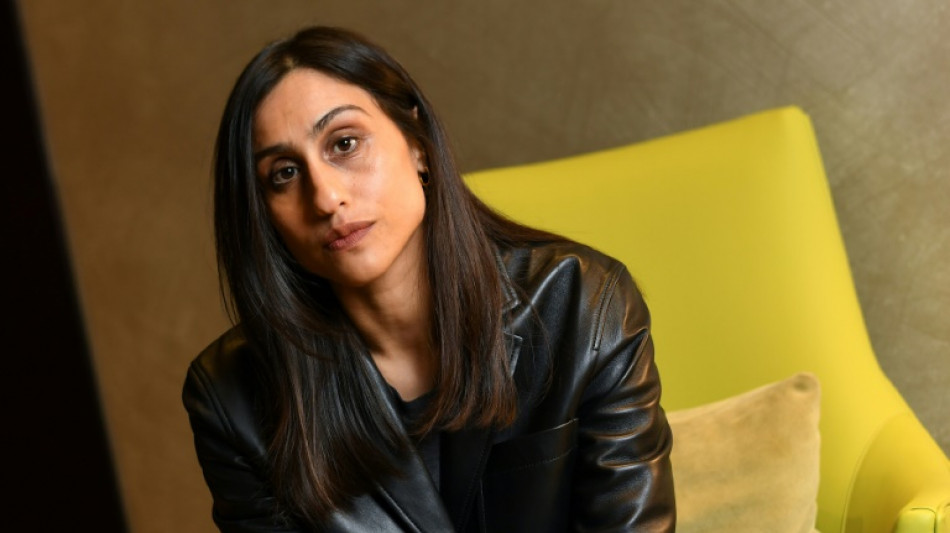

Bringing Sagan's 'Bonjour Tristesse' to modern moviegoers
When Canadian writer Durga Chew-Bose was asked to pen a new film adaptation of Francoise Sagan's hit 1954 coming-of-age novel "Bonjour Tristesse," she jumped at the chance, even going beyond the page to offer costume and music advice.
Ultimately, she was asked to direct as well and her first feature -- a modern take on Sagan's classic tale of wealth, ennui, excess and betrayal in the sun-dappled south of France -- has premiered at the Toronto film festival.
Chloe Sevigny, Claes Bang and Lily McInerny star in "Bonjour Tristesse" (Hello Sadness), the story of bored, bourgeois teenager Cecile (McInerny), who shatters her idyllic summer by conspiring to destroy her father's new girlfriend Anne.
Cecile's actions have unforeseen consequences that alter the lives of those around her, including her father Raymond (Bang), his jilted lover Elsa (Nailia Harzoune), and Anne (Sevigny), a close friend of Cecile's dead mother.
Chew-Bose, 38, says she particularly wanted to explore the relationships between the women, the lies they tell each other, and how they wield their power.
One particular scene in which Cecile, Elsa and Anne share a breakfast table is laced with unspoken tension.
"My vision was really strong in my own head, and I just had to say it out loud," Chew-Bose told AFP in an interview ahead of the film's premiere late Thursday.
"These women were really alive in my imagination for whatever reason."
The hiring of Chew-Bose to direct the film -- in English with snippets of French -- was not an obvious choice, given her lack of experience.
But producers Katie Bird Nolan and Lindsay Tapscott of Babe Nation said once they saw her screenplay, they knew she was the only one who could bring it to life.
"From her first draft, it was so visual," the 35-year-old Tapscott told AFP. "There were music choices, costume choices, production design. It was so clear that she had a directorial vision of the film."
- 'Very radical' -
Nolan and Tapscott have spent nearly eight years bringing "Bonjour Tristesse" -- which was adapted by Otto Preminger in 1958 -- back to the big screen.
Nolan, 42, admitted she went down a "rabbit hole" to learn all she could about Sagan, who died in 2004.
"Even though it had been written in 1954... there was just something that felt still very radical about the book. Cecile is acting purely for her own desires, taking exactly what she wants, how she wants it, when she wants it," Tapscott said.
Part of that long journey involved securing the audiovisual rights to the book from Sagan's publishers, and getting the blessing of her family.
Denis Westhoff, the author's son and an executive producer of the film, explained there were two competing proposals, but that Nolan and Tapscott wowed him with their "enthusiasm, interest, curiosity and deep wish to make the film."
The Canadian duo "planned to really maintain the spirit of the book," he told AFP.
With its cool, laconic language, "Bonjour Tristesse" caught the spirit of the 1950s -- and became an international best-seller, catapulting Sagan, who was herself a teenager when she wrote it, into a life of wealth, fame and excess.
In the film, Sevigny gives a beguiling spin to fashion designer Anne, whose liaison with Raymond upends Cecile's youthful ideals -- and ends in tragedy.
- 'Intrepid spirit' -
The film, shot over the space of a month in the town of Cassis, examines Cecile's insecurities, and her tentative attempts to embrace adulthood, both in her relationships with her father and his lovers, and her summer fling with a local boy.
For Chew-Bose, the book's themes are as relevant as they were 70 years ago.
"I think its portrayal of a young woman grappling with her coming of age, but also the many impasses that arrive with that moment in life... is very modern and very contemporary," she said.
Chew-Bose said she hopes the film will raise awareness about Sagan and lead moviegoers to pick up her slim but powerful novel.
"I think that a new generation should also be very much aware of who Francoise Sagan was, and how extraordinary it was that at her age, she wrote this book, and that she had the courage to have that kind of voice and that intrepid spirit," she said.
Westhoff noted that while his mother "didn't care at all about posterity," he thought she would be "flattered to know that her work was still alive."
O.McCarthy--IP




